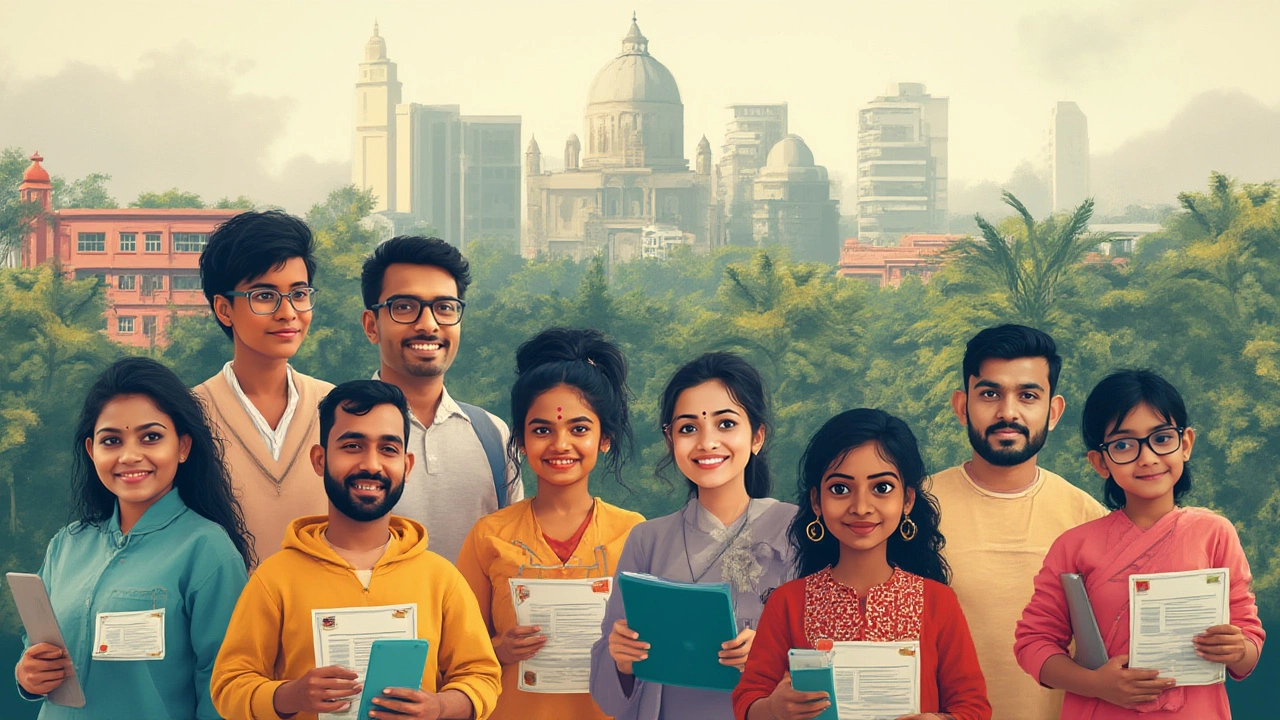Best English Teachers in India: Top Choices & Insights for 2025

Picture this: a jam-packed English coaching classroom in Delhi, the students barely able to contain their excitement because they're about to learn not just grammar, but the kind of English you see in movies. All across India, the search for the best English teacher in India isn’t just a hot topic—it’s downright fierce. Everyone wants to know: does the best English teacher have perfect pronunciation, stage presence, or maybe killer grammar hacks? Or does it come down to the number of success stories walking out each year, job letter in hand and confidence to match? It’s a question that won’t get old any time soon—and the answer may surprise you.
What Defines the Best English Teacher in India?
You’d think spotting the best English teacher would be as easy as looking at big billboards or checking YouTube channels with millions of subscribers. But real quality hides in plain sight. So what separates the brilliant from the just-okay? The obvious bit: deep knowledge of the English language. But there’s more. The best English teachers bridge the gap between text-book English and the language people actually use at work, online, and on the street. They know what Indian students struggle with (like mixing up tenses, pronunciation quirks, or blanking during job interviews), and tackle those challenges directly.
Here’s the kicker—great teachers focus on culture, not just words. They explain those weird English idioms, help you write a killer email, or coach you through the nerve-wracking small talk at a client meeting. You’ll also notice they’re master motivators. Students feel like they can actually “do it,” even if they started with zero confidence. So if you walk out of class feeling charged up to test your English, that’s usually a sign you’re learning from someone impressive.
One frequently praised trait of great English teachers in India: adaptability. They mix up their approach for newbies, job-seekers, and young professionals, blending traditional lessons with online learning. And yeah, they keep up with tech: WhatsApp groups, YouTube tutorials, podcasts, and digital homework are all part of the deal. It turns out, it’s never just the accent or the famous degree—it’s about how they unlock doors for their students in the real world.
Famous English Teachers and Their Unique Teaching Styles
If you dig into the English teaching scene, you’ll see some names pop up everywhere, not just in your local coaching center but across social media, TV, and even on national education panels. Shashi Tharoor, for instance, gets the spotlight for his vocabulary and punchy interviews, but he’s not really known for coaching beginners. When it comes to coaches who actually work day in and day out with students, there are a few standouts. Two names get lots of buzz: Neetu Singh and Aditya Rana. Both have helped thousands of aspirants crack government job interviews using razor-sharp lessons tailored to Indian students.
If you’re hunting for spoken English mastery, look at YouTube stars like Awal Madaan or Praveen Sir (Spoken English Guru). Their free video lessons reach millions, tackling common mistakes and dishing out quirky memory tricks. These teachers have flexible styles—they break down complex grammar into bite-sized chunks, and offer plenty of real-life examples. Some even act out “bad vs good” English phone calls or roleplay sales pitches. You almost feel like you’re learning from a friend.
But here’s the deal: the best teacher for one isn’t always the best for another. A fresher looking for fluency before a call center interview might swear by online trainers, while an MBA student aiming for global jobs might choose someone running advanced business English workshops in Mumbai or Bangalore. What stands out is that these top teachers rarely set rigid rules; instead, they experiment, personalize, and encourage everyone to use English in daily routines—ordering chai, chatting with a shopkeeper, or writing a Tweet. That’s where real growth happens.

Misconceptions About Learning English in India
It’s shocking how many myths still hold back learners. One of the biggest? That you must study in an English-medium school to speak fluently. Tons of successful professionals started in regional-language schools and built their English on the fly—often with the right teacher cheering them on. Another popular belief: mastering grammar is more important than speaking. The reality? There are highly respected trainers who focus almost entirely on conversation, using grammar just as supporting material. Their classrooms sound less like exam halls and more like busy cafés.
Here’s another misconception: native speakers make better English teachers. In India, some of the most effective teachers are Indians who get what it’s like to wrestle with “th” sounds or get nervous before group discussions. They create smart hacks for desi roadblocks, like switching between Hindi and English to build confidence or sharing relatable scripts for interviews and customer calls. Pros like Veena Hegde (Bangalore-based, teaching spoken English to homemakers and professionals) or Kaushik Roy (famous in Kolkata coaching circles) are proof that you don’t need to sound like a Brit or an American to teach top-quality English.
Don’t fall for paid testimonials or Instagram likes either. While social proof helps, true learning happens when you click with a teaching style and see actual results in daily life. Look for teachers whose students rave about landing real jobs, acing campus interviews, or just feeling at home in their own skin when they speak. Often, their Instagram pages show not just “before and after” videos but honest moments of struggle and improvement—way more valuable than a polished ad.
How to Pick the Perfect English Teacher for You
This gets personal fast—your background, your goals, your learning style, and even your daily routine all matter more than any popularity ranking. Here’s a nifty checklist to boost your search:
- Check for teachers who offer feedback, not just lectures—real growth happens when someone points out where you go wrong and helps you fix it with simple advice.
- Sample their style: Watch their free videos, join an intro class, ask for a quick phone call. Most reputable teachers share their content openly.
- Prioritize warmth and patience. Some trainers focus only on top scorers or extroverts; look for someone who encourages mistakes and makes learners feel safe.
- Consider group vs solo learning. Some shine in group discussions; others need 1-to-1 coaching. Teachers like Rajesh Srivastava run mixed workshops where you can try both.
- Tech matters: If you enjoy digital resources, pick teachers offering WhatsApp feedback, quizzes, and even “speaking buddies” for daily practice.
The best English teacher for you is often the one who unlocks your motivation, crafts lessons around your actual needs (job hunting, public speaking, casual conversation), and keeps you honest about your progress. If after a class you’re itching to practice—maybe by sending a voice note or debating with a friend—that’s half the battle won.

Real Impact: Stories and Paths of India’s Top English Teachers
Maybe what really sets the best English teachers apart isn’t just their certificates or how many books they’ve written. It’s their ability to change real lives. You’ll hear about trainers like Rinku Kumar in Patna, whose evening workshops help young women go from nervous giggles to nailing customer service calls. Or Priya Varma in Hyderabad, famous for her dramatic roleplays that help new managers feel confident addressing teams. These stories pop up from every corner of the country—a tiny tuition center in Kerala, a glowing online review from an IT recruiter in Pune, a thank-you email from a nurse who nailed an international exam after training for just six months.
India’s top English teachers break the mold in their own ways. Some run energetic classrooms with whiteboards covered in sticky-notes and quotes, others livestream from their smartphones to reach students in remote towns, or create WhatsApp groups for jump-in-anytime speaking practice. If you peek behind their methods, nearly all focus on giving power back to their students—equipping them to use English as a tool, not a hurdle.
The numbers tell a story too. Spoken English Guru’s YouTube channel, for example, crossed over 10 million subscribers last year, and their free resources are now used by auto drivers, engineers, and stay-at-home moms alike. Offline, teachers like Neetu Singh in Delhi continue to mentor thousands preparing for DSSSB and SSC exams, delivering high-impact grammar and interview training in record time. Even small-town teachers leave big footprints. Ask around—their ex-students often become neighborhood tutors themselves, spreading the ripple across generations.
But maybe the most important lesson? There isn’t one single “best” English teacher in India. There are hundreds of stars helping learners thrive, each with a unique recipe. The smartest move is to try a few, see who sparks your enthusiasm, and stick with the mentor whose teaching makes you hungry to learn day after day.

Post-Comment